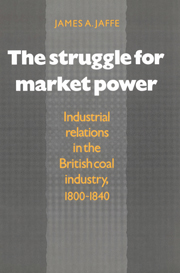Book contents
- Frontmatter
- Contents
- Acknowledgment
- Abbreviations
- Introduction
- 1 Capital and credit
- 2 The perception of the market and industrial policy
- 3 Managerial capitalism
- 4 Family, community, and the labor market
- 5 Work and the ideology of the market
- 6 Religion, ideology, and trade unions
- 7 The transformation of market relations: Tommy Hepburn's union, 1831
- 8 Epilogue: class struggle and market power
- Conclusion: the labor process and the market
- Appendix
- Select bibliography
- Index
6 - Religion, ideology, and trade unions
Published online by Cambridge University Press: 17 September 2009
- Frontmatter
- Contents
- Acknowledgment
- Abbreviations
- Introduction
- 1 Capital and credit
- 2 The perception of the market and industrial policy
- 3 Managerial capitalism
- 4 Family, community, and the labor market
- 5 Work and the ideology of the market
- 6 Religion, ideology, and trade unions
- 7 The transformation of market relations: Tommy Hepburn's union, 1831
- 8 Epilogue: class struggle and market power
- Conclusion: the labor process and the market
- Appendix
- Select bibliography
- Index
Summary
The influence of evangelical religion upon the British working class revolves about one of the implicit themes of this work: the accommodation of the working class to early industrial capitalism. It has already been argued that while industrial relations were inevitably contentious in the first half of the nineteenth century, they were nonetheless anchored in the mutual acceptance of the ideology of the marketplace principally through the practice of workplace bargaining over piece rates. Moreover, as will be shown in succeeding chapters, labor struggles in the early-nineteenth-century coal industry reflected the contest for control of the labor and product markets rather than for control of the labor process.
This argument runs counter to at least one tradition of historical and sociological work that posits religion as one of the principal forces acting to accommodate or subject the working class to the new industrial order. Elie Halévy is perhaps the name most often connected with this thesis. However, it is hoped that by directing attention toward the fundamental importance of the role of the workplace and industrial relations in the creation of ideology, the role of evangelical religion in the lives of the northern working class can be placed in a different perspective. Rather than acting as an agent of submission or accommodation, evangelicalism during this era was the religion of a distinct minority in the coalfields, and its connection to the early labor movement was both pragmatic and ephemeral.
Max Weber's work has necessarily had a profound impact upon the controversy over religion and the working class during the Industrial Revolution, and it is worthwhile pointing out some of its aspects that have influenced the study of British social history.
- Type
- Chapter
- Information
- The Struggle for Market PowerIndustrial Relations in the British Coal Industry, 1800–1840, pp. 120 - 148Publisher: Cambridge University PressPrint publication year: 1991

